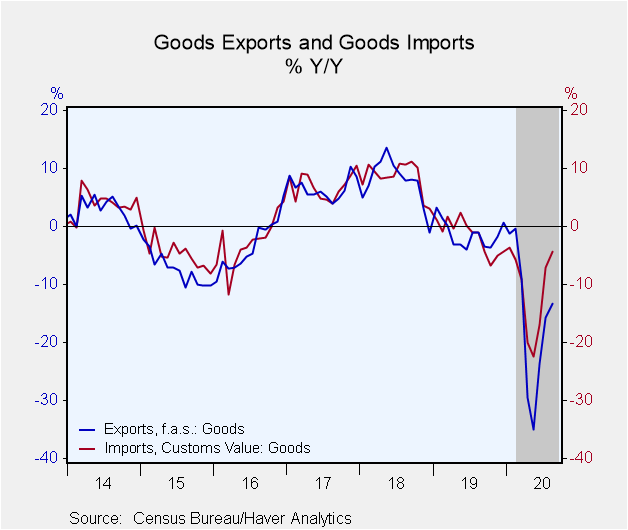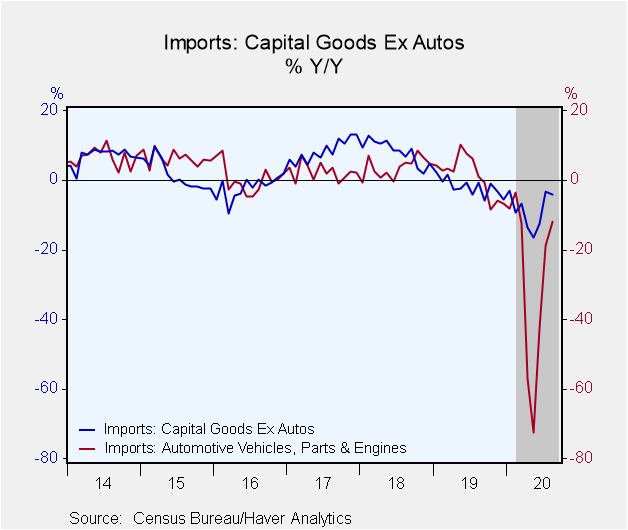 Global| Sep 29 2020
Global| Sep 29 2020U.S. Goods Trade Deficit Continues to Deepen in August
by:Tom Moeller
|in:Economy in Brief
Summary
• Goods trade deficit widened more than expected as both export & import growth remained firm. • Y/Y export deterioration continues to surpass imports. The advance estimate of the U.S. trade deficit in goods widened to $82.94 billion [...]
• Goods trade deficit widened more than expected as both export & import growth remained firm.
• Y/Y export deterioration continues to surpass imports.
The advance estimate of the U.S. trade deficit in goods widened to $82.94 billion last month from $80.11 billion in July. An $81.8 billion deficit had been expected in the Action Economics Forecast Survey.
Exports improved 2.8% (-13.3% y/y) following a 12.0% jump. Industrial supplies & materials exports surged 10.6% (-11.0% y/y) while foods, feeds & beverages rose 9.8% (-3.3% y/y). Nonauto consumer goods exports rose 1.2% (-11.2% y/y) but auto exports eased 0.7% (-14.0% y/y). Exports of capital goods fell 3.9% (-18.2% y/y).
Imports increased 3.1% (-4.3% y/y) after surging 12.4% in July. Nonauto consumer goods imports rose 7.0% (2.4% y/y) while auto imports gained 6.2% (-11.9% y/y). Foods, feeds & beverage imports increased 5.3% (6.8% y/y) and capital goods imports rose 1.4% (-4.1% y/y. Industrial materials & supplies imports declined 4.6% (-11.3% y/y).
The advance international trade data can be found in Haver's USECON database. The expectation figure is from the Action Economics Forecast Survey, which is in AS1REPNA.
| Advance U.S. Foreign Trade in Goods (Customs Value $) | Aug | Jul | Jun | Aug Y/Y | 2019 | 2018 | 2017 |
|---|---|---|---|---|---|---|---|
| U.S. Trade Deficit ($ bil.) | -82.94 | -80.11 | -70.95 | -73.66 (8/19) |
-854.37 | -872.04 | -792.40 |
| Exports (% Chg) | 2.8 | 12.0 | 14.4 | -13.3 | -1.4 | 7.7 | 6.6 |
| Imports (% Chg) | 3.1 | 12.4 | 5.1 | -4.3 | -1.6 | 8.5 | 7.0 |
Note: Current month is based on Advance Trade data; Previous months reflect revised data from International Trade release.
Tom Moeller
AuthorMore in Author Profile »Prior to joining Haver Analytics in 2000, Mr. Moeller worked as the Economist at Chancellor Capital Management from 1985 to 1999. There, he developed comprehensive economic forecasts and interpreted economic data for equity and fixed income portfolio managers. Also at Chancellor, Mr. Moeller worked as an equity analyst and was responsible for researching and rating companies in the economically sensitive automobile and housing industries for investment in Chancellor’s equity portfolio. Prior to joining Chancellor, Mr. Moeller was an Economist at Citibank from 1979 to 1984. He also analyzed pricing behavior in the metals industry for the Council on Wage and Price Stability in Washington, D.C. In 1999, Mr. Moeller received the award for most accurate forecast from the Forecasters' Club of New York. From 1990 to 1992 he was President of the New York Association for Business Economists. Mr. Moeller earned an M.B.A. in Finance from Fordham University, where he graduated in 1987. He holds a Bachelor of Arts in Economics from George Washington University.
More Economy in Brief
 Global| Feb 05 2026
Global| Feb 05 2026Charts of the Week: Balanced Policy, Resilient Data and AI Narratives
by:Andrew Cates










